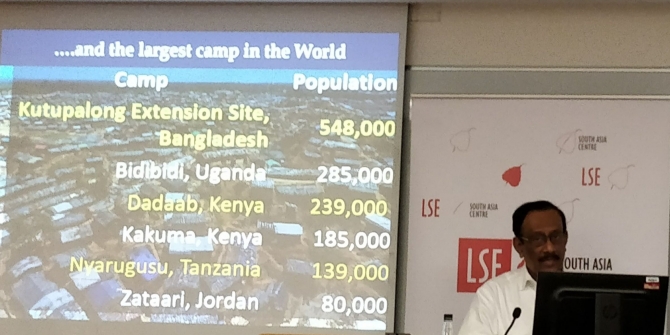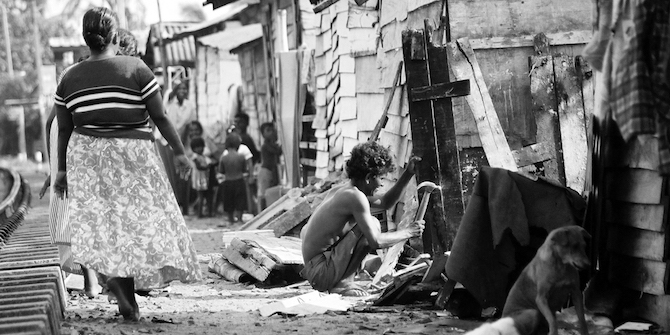 This is the final segment of the two-part report on “Rohingya Humanitarian Crisis: Bangladesh’s response”, where SAC hosted Mr Md. Shahidul Haque, Foreign Secretary, Government of Bangladesh. Dominique Dillabough-Lefebvre writes about issues of of repatriation, refoulement and Rohingya nationality, based on his interview with Mr Haque and his presentation. Read Part 1 here.
This is the final segment of the two-part report on “Rohingya Humanitarian Crisis: Bangladesh’s response”, where SAC hosted Mr Md. Shahidul Haque, Foreign Secretary, Government of Bangladesh. Dominique Dillabough-Lefebvre writes about issues of of repatriation, refoulement and Rohingya nationality, based on his interview with Mr Haque and his presentation. Read Part 1 here.
During the interview, ahead of the South Asia Centre event “Rohingya Humanitarian Crisis: Bangladesh’s response”, I pressed Mr Md. Shahidul Haque, Foreign Secretary, Government of Bangladesh, on the issue of Rohingya nationality, and whether the swift signing of a repatriation agreement between Myanmar and Bangladesh implied an acknowledgement of the nationality of Rohingyas on the part of Myanmar. The question of ‘nationality’ was side-stepped, he said, as Myanmar officially calls the Rohingyas ‘residents’ and refuses to acknowledge their citizenship rights.
“Because of the international pressure they wanted to have an arrangement to show the world that the problem is solved […] We were also surprised when they accepted these issues, because […] I can see they are not very sincere about their commitments.
One of my questions when I sit with my Myanmar colleagues: When it comes to return you are asking about verification of their identity, you’re talking about whether they were residents in the Northern Rakhine or not. […] To our utter surprise, when people were walking in a desperate situation there was news coming out of Myanmar that this was all fake news, that this is huge propaganda, this is not real, this is to malign the government and bring down the democracy in Myanmar and all sorts of things.”
It was also made clear that Bangladesh’s policy of referring to the Rohingya as ‘forcibly displaced Myanmar nationals’ was part of a 2013 official Mutual agreement between the two countries, according to which Bangladesh would not call them Rohingyas and the Burmese wouldn’t call them Bengalis. However this agreement is no longer in place between the two states, and Bangladesh now feels that this was “a ploy” to displace responsibility.
Burmese avoidance of responsibility has ranged from outright denial of killings to drastically underestimated numbers of deaths (of whom they claim are largely terrorists). The Myanmar government continues to assert that Rohingyas fled in part due to threats from the ARSA insurgents who raided Myanmar security posts on 25 August 2017 and that they were responsible for burning down their own villages. Mr Aung Hla Tun, Myanmar Deputy Minister of Information, has reportedly said, “most of these people fled in panic just after the military operations following the terrorist attacks, for fear of being arrested for their involvement or on suspicion” and they were “were persuaded to flee” by the prospect of “better livelihood at the camps in Bangladesh”.
“There is no ethnic cleansing or genocide in our country,” U Aung Tun Thet, the Chief Coordinator of the Myanmar government, a body dedicated to the Rohingya crisis, has said. “Accusations are very easy to make, but we are not involved in anything at all.”

As a reply to such comments, Mr Haque explained: “They have a very good propaganda machine trained the way Hitler’s regime trained it’s own propaganda machine and using it against a particular community… Some of the things that are being said are absolutely incorrect. Number 1: they think the Rohingyas are Bengalis from Bangladesh, that is the first narrative, so they should go back to Bangladesh. Second is they are all terrorists. [….In a list of 430 people, which the Myanmar government claims are terrorists hiding in Bangladesh, is a 3-year-old child….] The third narrative is that the sovereignty and security of Myanmar is at threat, so they have every right to deploy whatever they want to protect their sovereignty.”
Foreign Secretary Haque’s comments reflect Bangladesh’s view that Myanmar’s denialism is a characteristic of the myopic outlook of the Burmese government. Burmese journalists Wa Lone and Kyaw Soe Oo have been imprisoned for reporting evidence of the killing of 10 Rohingya men (see PEN press release, and Reuters report) found in a mass grave, and mounting public statements from UN officials and NGO bodies reflect a growing consensus that sufficient evidence is increasingly available to hold the Burmese government accountable. Early this year, Yanghee Lee, UN Special envoy on human rights, was denied access to Myanmar, and noted that the events “bear the hallmarks of genocide”.
Since the first Arakan Rohingya Salvation Army attacks in late 2016, ongoing conflict in Rakhine State has rarely been discussed in Myanmar’s national parliament. This signals the reluctance among parliamentary members and the NLD to publicly speak out on such issues. It also reflects a disjuncture between the ‘democratic’ arms of government that appear to hold little control beyond civilian government and the military control, which has strengthened its grip since the 2015 elections, which were deemed to signal positive changes for Myanmar’s developmental trajectory. The NLD has moved beyond ‘towing the line’, and since garnered much support amongst the ethnic Bamar who appear to be largely behind the military operation against the Rohingya.
On the topic of return and repatriation, Mr Haque stressed two important issues. Firstly, the repatriation agreement in place with Myanmar includes a provision in which Bangladesh must verify that the conditions are safe and secure. Therefore repatriation must not constitute refoulement. Here the difficulties faced by Bangladesh are clear:
“Our prime minister has made a commitment that they will be sent back in safety and security and in a dignified manner and we will live up to our commitment… We will only send them back when things are safe and secure for them on the other side. … If you look at the current camps it looks like anything but a human-friendly place to live.”
With the Burmese military clearing a large number of villages with heavy machinery and establishing new border force bases and regiments in Rakhine State’s Maungdaw District, such words are particularly timely.
This being said is that Mr Haque repeated the need to not succumb to the desire of the government of Myanmar to ensure that the Rohingya do not return. In his words: “they are creating all kinds of conditions and propaganda so that these people never come back through fear, and then they can implement their grand design: setting up a cantonment and export processing zone and all sorts of things”. There has been a dramatic push for increased business and infrastructure investment in Rakhine. This is largely following a UEHRD conference in Naypyidaw in October, where Aung Ko Win of KBZ, Zaw Zaw of Max Myanmar, Steven Law of Asia World, Chit Khine of Eden, and Khin Shwe of Zaykabar, among others pledged significant sums for development and reconstruction projects, including a 2.2 million border fence.
Mr Haque noted that it seems like the Myanmar government wishes to maintain the status quo, by keeping the Rohingyas out and want Bangladesh to support their policy.
“The Myanmar government should understand that they are a multi-ethnic and multi-religious country and they have to really work to make sure that minorities feel safe and secure in their country. If they haven’t done it, they must learn it from others. And there are terrible things that can happen if you are not taking care duly of your minorities, both in terms of their rights and their future. And that is why Myanmar government is struggling with all ethnic communities, not only the Rohinyas. It’s all the ethnic communities.”
Here the Bangladeshi foreign secretary also stressed that upon return the Rohingya should not be criminalised with potential immigration cases and discriminated against (this follows the policies of resettlement and re-integration from UN 1951 convention), and should have their rights.
“If you ask them what they want to do they would say they would like to go back to the Burma land, that’s their standard answer. They want to go back and have the property that they used to have. After so many atrocities, so much rape, so much abuse, how a nation (sic) wants to go back to the same is also a question.”
The concluding remarks were given by LSE South Asia Centre Deputy Director Nilanjan Sarkar . LSE South Asia Centre, in coordination with the University of California-Berkeley, will host the LSE Bangladesh Summit on Tuesday, 5 June 2018. Details here.
Cover image: One IDP camp near Sittwe can only be accessed by sea with boats transporting vital aid supplies such as rice and cooking oil. Credit: Mathias Eick, EU/ECHO, Rakhine State, Myanmar/Burma, September 2013 /CC BY-ND 2.0
This is the final part of the two-part series on South Asia Centre event “The Rohingya Humanitarian Crisis: Bangladesh’s Response.” The first part of the report can be read here and click here for the podcast of the event.
This article gives the views of the author, and not the position of the South Asia @ LSE blog, nor of the London School of Economics. Please read our comments policy before posting.
About The Author
 Dominique Dillabough-Lefebvre is a doctoral candidate Anthropology at the London School of Economics (LSE) and Leverhulme Trust Scholar at the London School of Economics’ International Inequalities Institute (LSE). His research looks at the politics of agrarian change in Myanmar, in particular the effects of alterations in legal land regimes upon long-standing inequalities among minority ethnic and peasant groups. He is also a photographer & film-maker, and has conducted ethnographic work and photographic projects in countries including Nepal, Myanmar, Bolivia, South Africa, Canada, and the UK.
Dominique Dillabough-Lefebvre is a doctoral candidate Anthropology at the London School of Economics (LSE) and Leverhulme Trust Scholar at the London School of Economics’ International Inequalities Institute (LSE). His research looks at the politics of agrarian change in Myanmar, in particular the effects of alterations in legal land regimes upon long-standing inequalities among minority ethnic and peasant groups. He is also a photographer & film-maker, and has conducted ethnographic work and photographic projects in countries including Nepal, Myanmar, Bolivia, South Africa, Canada, and the UK.







